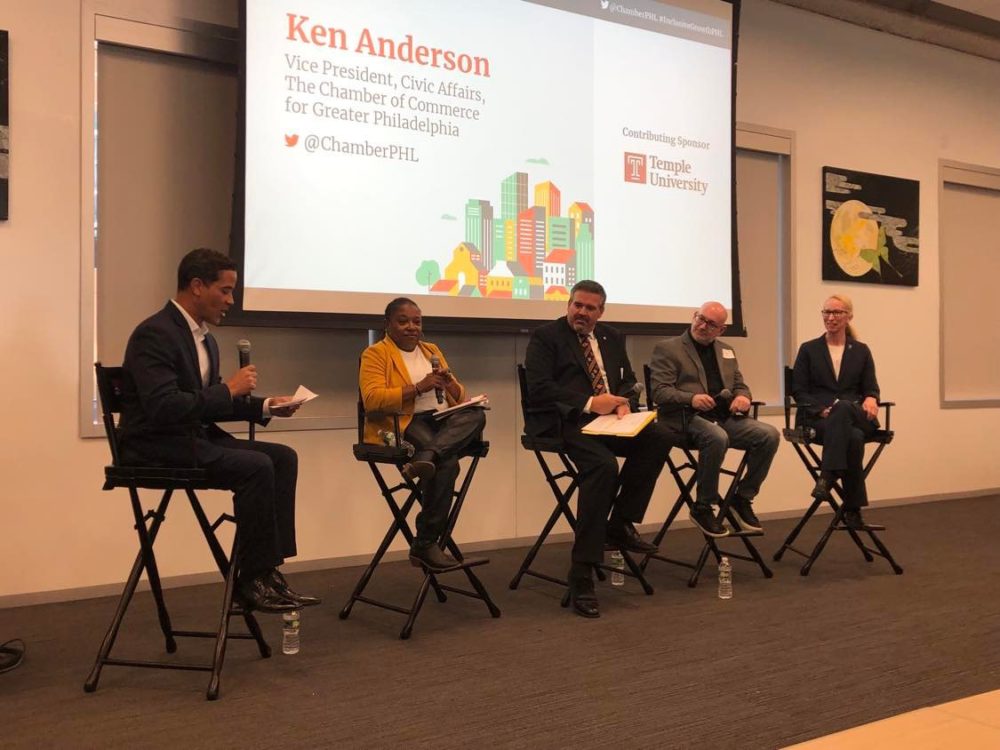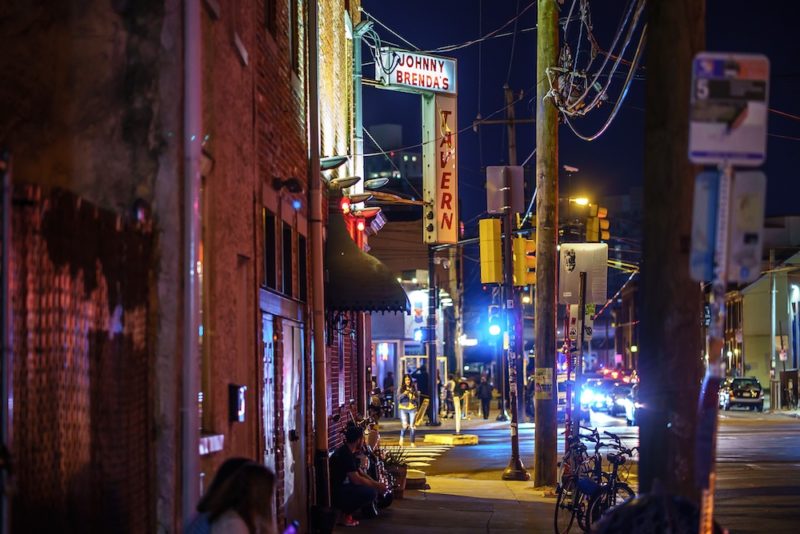According to data collected by the Pew Charitable Trusts earlier this year, 70% of Philadelphians think crime, drugs and public safety are the most important issues in the city. Just 44% of residents say they feel safe in their neighborhoods at night.
With these statistics in mind, the Chamber of Commerce for Greater Philadelphia hosted a forum on “Securing a Safer City” last week to discuss public safety and what businesses and citizens of Philadelphia can do to address concerns about violence.
“Both socially and economically, a more collaborative approach is needed to improve safety and lives, stimulate recovery and economic prosperity throughout all of Philadelphia,” said Ken Anderson, the Chamber’s VP of civic affairs and the panel’s moderator.
The panel featured Erica D. Atwood, senior director of the City of Philadelphia’s Office of Policy and Strategic Initiatives for Criminal Justice and Public Safety; Marc Collazzo, executive director of the Fishtown Kensington Area Business Improvement District (BID), Jennifer Griffin, VP for public safety at Temple University; and Scott Sauer, COO of SEPTA.
What public safety means
Solving the problem requires understanding it. As Atwood pointed out, public safety involves much more than law enforcement — it’s also about prevention and intervention.
“We can’t arrest our way out of this problem,” she said. “When we talk about the root causes of why we’re seeing this deadly symptom of gun violence, we have to talk about economic mobility and what does it mean, not just to have a job, but to have a good job, for it to be purpose driven, for it to have a trajectory for you.”
Atwood gave the example of an apartment that now costs three times as much to rent as it did 20 years ago. Her point: A person needs a job with a salary that grows so they can afford to continue living in their neighborhood. This connects to the importance of social cohesion, or living in a neighborhood where a person has connections and knows their neighbors, Atwood said. That’s lost when they are forced to move because they can’t afford their home anymore. This plus access to physical and mental health resources, good schools and education are all important to promoting public safety.
How Philly stakeholders are working to improve public safety
Each of these panelists’ organizations are doing its own work to help improve public safety in Philly. Atwood said the City developed a five-year plan in 2018 called the Roadmap to Safer Communities that is focused on supporting youth, more authentic community engagement and better coordinated city services.
“We talked to all types of stakeholders,” Atwood said. “We talked to not only kind of the business community, but we also talked to folks who have lived experience.”
On the university end, Griffin said some of the ways Temple keeps students safe include a public safety app, walking escorts and a shuttle system. She also noted that Temple has partnerships with community institutions like local police and health centers.

(L to R) Ken Anderson, Erica D. Atwood, Scott Sauer, Marc Collazzo and Jennifer Griffin. (Photo by Sarah Huffman)
Collazzo said his BID organization created a program called Fishtown Ambassadors, which are individuals trained in de-escalation — aka strategies to diffuse a potentially violence situation — who check in frequently with businesses in the well-trafficked area.
“One of the things that you’re hearing from all of us, which is very important, is collaboration,” Collazzo said. “None of this gets done in a vacuum. We can’t do it ourselves, which means that we work with the Office of Homeless Services, the Crisis Intervention Team [through 911], [human services nonprofit] Lutheran Settlement House and law enforcement to make sure that we are maximizing what those agencies do.”
And on the region’s largest transportation network, Sauer said SEPTA introduced a program called the Safety, Cleaning, Ownership, Partnership and Engagement (SCOPE) program in 2021. It’s a collection of all the work it is trying to do to maintain safe, clean transportation and stations, while also assisting people who are experiencing homelessness, addiction and the like. He said he’s seen outside organizations interested in getting involved with the program, giving the example of Drexel University offering its medical students as “health navigators” who would ask vulnerable people in stations or on transportation if they needed help, and if so, direct them to resources.
What can businesses do? Partners and de-escalation are key
Atwood said neighborhood businesses play two roles in the issue of public safety: They’re the eyes and ears of what’s going on in the community, as well as strong partners and supporters of organizations working on public safety.
“Some entrepreneurs and small businesses tend to be some of our largest employers of those with lived experience” of violence, she said. “They are the ones that will be willing to show up when we need support and ideas from the business community. On the other hand, they tend to be some of the most vulnerable to some of the issues that we’re seeing around public safety.”
Businesses can call Philly’s 211 hotline to find resources for public safety.
Sauer said the business community and SEPTA, too, should be partners and resources for each other. SEPTA supports neighborhood businesses by providing transportation, but also through surveillance cameras on its vehicles — “so we can be a partner with you on security, on safety, just as much as we’re a partner on transportation,” he said, “and just the fact of us being there. Hopefully will help set your mind at ease that somebody’s watching because our cameras are always rolling.”
Echoing Atwood’s description of the systemic causes of violence, Griffin said much of what she hears from business owners is that with any instance of violence or crime, there is usually a quality of life issue behind it. That’s why it’s especially important to use de-escalation skills when addressing people in these situations, as they may be experiencing a crisis. De-escalation training has been hosted by both the Fishtown BID and for SEPTA employees, too.
Basic de-escalation strategies include remaining calm, actively and empathetically listening to the distressed person, and moving the conversation out of public view. See more from the US Department of Homeland Security.
Atwood added that the last few years with the pandemic have exacerbated circumstances that may result in violence, making de-escalation even more valuable.
“We have to support organizations, those that are closest to the problem tend to be the closest to solutions, with the least amount of privilege and power,” Atwood said. “And so those of us who do have power, how do we share that? How do we impart that on those who have the ability to make the change and find the cure?”
Sarah Huffman is a 2022-2024 corps member for Report for America, an initiative of The Groundtruth Project that pairs young journalists with local newsrooms. This position is supported by the Lenfest Institute for Journalism.Join the conversation!
Find news, events, jobs and people who share your interests on Technical.ly's open community Slack

Philly daily roundup: East Market coworking; Temple's $2.5M engineering donation; WITS spring summit

Philly daily roundup: Jason Bannon leaves Ben Franklin; $26M for narcolepsy treatment; Philly Tech Calendar turns one

Philly daily roundup: Closed hospital into tech hub; Pew State of the City; PHL Open for Business


